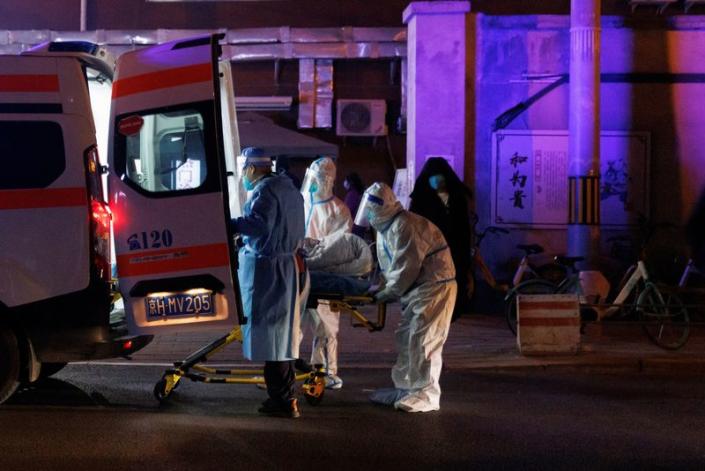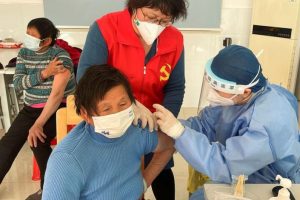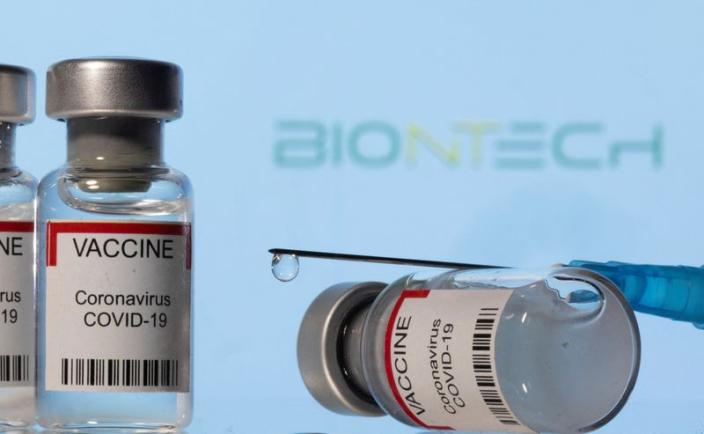Germany has sent a batch of Covid vaccines to China – the first delivery of foreign mRNA vaccines, seen as the most efficient against the disease – known to have been relayed from abroad.
The BioNTech vaccines will be given initially to German expatriates, a government spokesperson in Berlin said on Wednesday.
The shipment comes after China agreed to allow German nationals in the country, said to number about 20,000, to get the shot following a deal during Chancellor Olaf Scholz’s visit in Beijing last month.
No details were available on the timing or size of the delivery, but the spokesperson said Berlin was pushing for foreigners other than Germans – estimated to number about 845,000 – to be allowed access to the shot if they want it.
Scholz was also said to have pressed President Xi Jinping to allow the shot to be made freely available to Chinese citizens as well.
ALSO SEE:
Bankman-Fried in US as FTX Associates Plead Guilty to Fraud
In a letter to be sent to German citizens in mainland China, the government said it would offer basic immunisations and booster shots of vaccines approved for use in the European Union for free to anyone over 12 years of age.
Family members of other nationalities would not be included. Vaccinations for children under 12 may follow at a later date.
“We are working on the possibility that besides Germans also other foreigners can be vaccinated with BioNTech,” the spokesperson told journalists in Berlin.
The shots will be delivered to German companies in China as well as embassy locations and talks are underway with other EU governments about getting them to citizens of other nationalities, a source familiar with the situation said.
China would need to approve expanding access beyond German nationals, the source said.
In return, Chinese citizens in Europe can be vaccinated with China’s SinoVac, the spokesperson said.
The comment comes after a report earlier this month that Germany’s health ministry had granted a permit allowing China’s Sinovac vaccine to be imported to Germany to be given to Chinese citizens in that country.
The shot has not been approved for use by Europe’s drug regulator, but the World Health Organization has given its green light for its use.
BioNTech Shares Rise
Beijing has so far insisted on using only domestically produced vaccines, which are not based on the Western mRNA technology but on more traditional technologies.
The shipment comes amid Beijing dismantling its strict “zero-Covid” regime of lockdowns, which has led to a surge of cases that caught a fragile health system unprepared.
Experts predict that the country of 1.4 billion people could face more than a million Covid deaths from this month to next year.
Allowing German expats access to a Western shot is a big gesture to Berlin, reflecting Beijing’s effort to strengthen ties with EU’s biggest economy after years of tensions over trade and climate between the two countries.
Shares in BioNTech rose on news of the shipment, closing 2.3% higher in Frankfurt while Pfizer shares in New York were up 1.25% in late morning New York trade.
BioNTech was not available to comment on the situation on Wednesday.
No Western Vaccines
China has nine domestically developed Covid vaccines approved for use, more than any other country. But none has been updated to target the highly infectious Omicron variant, as Pfizer-BioNTech and Moderna have for boosters in many developed countries.
The two shots developed by Pfizer-BioNTech and Moderna are the most widely used around the world.
Early on in the pandemic, BioNTech struck a deal with Shanghai Fosun Pharmaceutical with a view to supply the shots to greater China.
While the shots became available in Hong Kong, Macau and Taiwan, the regulatory review for mainland China has not been concluded. BioNTech has said that decision was up to Chinese regulators and has not given a reason for the delay.
China’s zero-Covid policy and lockdown measures have kept death and infection rates minimal over the past months but caused massive disruptions both domestically and in global trade and supply chains.

Death Toll ‘Unreliable’
Chinese authorities – who narrowed the criteria for Covid deaths, prompting criticism from many disease experts – confirmed 389,306 cases with symptoms.
The National Health Commission said on Tuesday only deaths caused by pneumonia and respiratory failure in patients who had the virus are classified as Covid deaths.
So the country reported no new fatalities for Tuesday, and even crossed one off its overall tally since the pandemic began, now at 5,241 – a fraction of the tolls of many much less populous countries.
And on Thursday China reported no new Covid deaths for a second consecutive day for December 21, even as funeral parlour workers say demand has jumped in the past week, pushing fees higher.
Some experts say official figures have become an unreliable guide as less testing is being done across China following the easing of restrictions.
While less than 10 deaths have been recorded this month, London-based analytics firm Airfinity has forecast that China could see up to tens of thousands of fatalities a day by late January if it doesn’t ramp up shots and boosters of its ‘new-generation’ vaccines.
5.4m Cases in Shanghai: Hospital
Meanwhile, a Shanghai hospital has told its staff to prepare for a “tragic battle” with Covid-19 as it expects half of the city’s 25 million people to get infected by the end of the year.
After widespread protests and a relentless rise in cases, China took an abrupt shift in policies two weeks ago and dismantled its zero-Covid regime, which had taken a great financial and psychological toll on its 1.4 billion people.
The Shanghai Deji Hospital, posting on its official WeChat account late on Wednesday, estimated there were about 5.43 million positives in the city and that 12.5 million in China’s main commercial hub will get infected by the end of the year.
“This year’s Christmas Eve, New Year’s Day, and the Lunar New Year are destined to be unsafe,” the hospital said.
“In this tragic battle, the entire Greater Shanghai will fall, and we will infect all the staff of the hospital! We will infect the whole family! Our patients will all be infected! We have no choice, and we cannot escape.”
Shanghai residents endured a two-month lockdown which ended on June 1, with many losing income and having poor access to basic necessities. Hundreds died and hundreds of thousands were infected during those two months.
Experts say China could face more than a million Covid deaths next year, given relatively low full vaccination rates among its vulnerable elderly population.

Elderly Hit Hard
China’s vaccination rate is above 90%, but the rate for adults who have received booster shots drops to 57.9%, and to 42.3% for people aged 80 and above, government data shows.
At a hospital in Beijing, footage from state television CCTV showed rows of elderly patients in the intensive care unit breathing through oxygen masks. It was unclear how many had Covid.
The deputy director of the hospital’s emergency department, Han Xue, told CCTV they were receiving 400 patients a day, four times more than usual.
“These patients are all elderly people who have underlying diseases, fever and respiratory infection, and they are in a very serious condition,” Han said.
The World Health Organization said it is concerned about the spike in infections and is supporting the government to focus on vaccinating those at the highest risk.
Medical Supplies Ramped Up
China’s policy U-turn caught a fragile health system unprepared, with hospitals scrambling for beds and blood, pharmacies for drugs and authorities racing to build special clinics.
Smaller cities away from the affluent eastern and southern coast are particularly vulnerable. Tongchuan, a city of 700,000 in the northwestern Shaanxi province, called on Wednesday for all medical workers who retired in the past five years to join the battle against Covid.
“Medical institutions at all levels in the city are under great pressure,” it said in a public notice.
State media said local governments were trying to tackle drug shortages, while pharmaceutical companies were working extra-time to boost supplies.
Cities across the country were distributing millions of ibuprofen tablets to medical institutions and retail pharmacies, according to a report in the state-run Global Times.
Some Chinese experts predict the Covid wave will peak in late January, with life likely to return to normal by late February or early March.
- Reuters with additional editing by Jim Pollard
NOTE: Further details were added to this report on December 22, 2022.
ALSO SEE:
Corporate China in ‘Deep Trouble’ as Covid Infects Workforce
World Bank Cuts China Growth Forecast For 2022 And 2023
Chinese Hospitals Swamped by Covid Wave, US Airs Concern
























